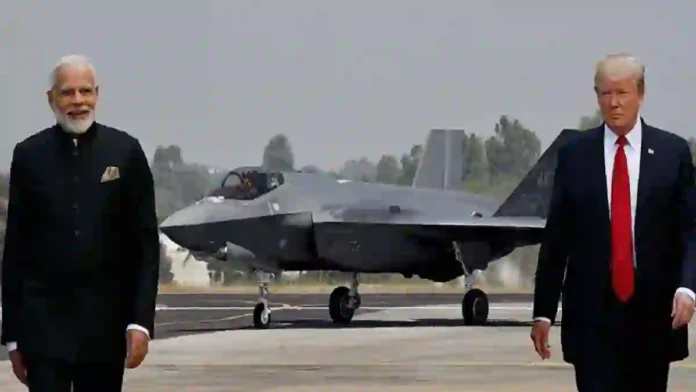The Government of India has officially informed the Lok Sabha that no formal discussions or negotiations have taken place with the United States regarding the purchase of F-35 fifth-generation fighter jets. This clarification was provided by Kirti Vardhan Singh, Minister of State for External Affairs, in response to a question from Congress MP Balwant Baswant Wankhade. Despite references in the India-US joint statement issued after Prime Minister Narendra Modi’s visit to Washington in February 2025, which mentioned a potential US policy review on transferring advanced military platforms like the F-35 to India, no concrete dialogue or proposal has materialised on this front.
This official position aligns with reports citing unnamed sources from Bloomberg and other media outlets, which indicated that India has effectively ruled out any immediate defensive procurement from the US, including the F-35 jets.
Read- India Prepares to Hunt With The Fastest Missiles In The World Under Project Kusha
Instead, the Indian government is exploring trade and diplomatic avenues to manage the fallout of President Donald Trump’s announcement of a 25% tariff hike on Indian exports, which took effect from August 1, 2025. Indian officials reportedly expressed shock and disappointment over the tariff announcement but are not pursuing retaliatory measures. Instead, New Delhi is contemplating increasing imports from the US, including natural gas, communication equipment, and gold, to maintain bilateral trade relations.
The decision to decline the F-35 offer reflects India’s broader defence acquisition strategy focused on joint development and production under its “Make in India” initiative rather than off-the-shelf purchases from foreign suppliers. During PM Modi’s February 2025 Washington visit, President Trump pushed for the sale of F-35A stealth fighter jets, but Indian officials conveyed a preference for co-development arrangements.
Analysts see India’s rejection of the F-35 purchase as indicative of ongoing challenges in domestic defence production—India’s indigenous fighters like the TEJAS program have had limited success—and a strategic calculus weighing long-term sovereignty and self-reliance over immediate acquisitions. India is also reportedly considering other options such as Russian fifth-generation Su-57 jets and strengthening its domestic aerospace industry in collaboration with countries like France.
Tensions in the India-US relationship appear to have been exacerbated by President Trump’s public statements following the tariff announcement. Trump accused India of maintaining stringent trade barriers and criticised India’s defence and energy ties with Russia.
Read- India’s Missile Might Versus Pakistan’s Failed Missile Flights
Read- India’s New ‘Pralay’ Missile Can Deliver A 1000 Kg Punch
He notably dismissed the strategic importance of India and Russia as “dead economies” in posts on his social media platform, Truth Social. These statements have reportedly complicated bilateral trade negotiations and underscored underlying geopolitical frictions amidst ongoing diplomatic communications on other fronts, including US involvement in attempts to de-escalate India-Pakistan tensions following the April 22 terrorist attack in Pahalgam.
The government has maintained a focused, measured, and non-escalatory stance in these interactions, communicating through diplomatic and military channels, including to US officials such as Vice President J.D. Vance.
As of August 2025, despite earlier indications in joint statements and US outreach, India has not engaged in formal discussions for purchasing F-35 fighter jets and appears focused on maintaining a strategic balance in its defence procurement policy, prioritising domestic collaboration and trade diplomacy in a complex bilateral environment marked by recent trade tensions and geopolitical challenges.
Based On A PTI Report
Agency




